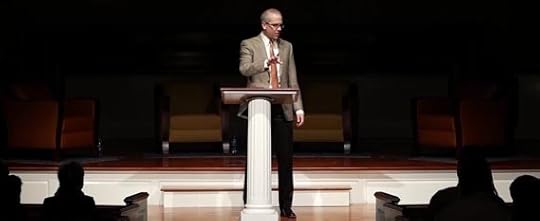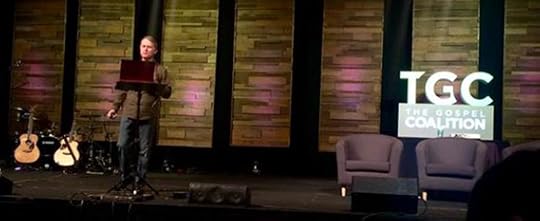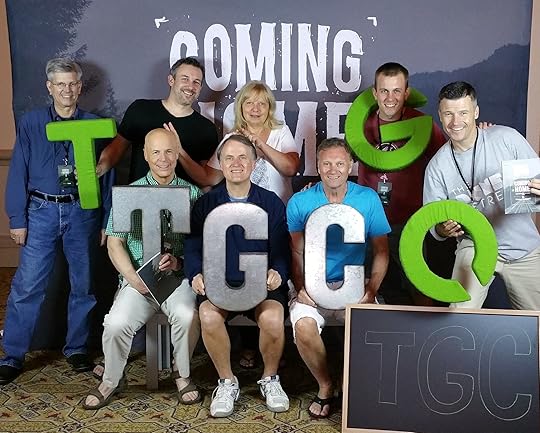Randy Alcorn's Blog, page 165
May 15, 2015
How Should We Interpret the Bible?

For years, I taught biblical interpretation at a Bible college. We studied the different types of biblical literature and how to interpret each. In the classroom, we’d often go to texts commonly understood a certain way, then try to discern what the original writer was conveying to the original readers.
Often we found a striking difference between what the texts actually said and how they were popularly understood. We realized that our minds often weren’t open to the meaning of the texts because of the preconceived ideas we were reading into them, ideas we’d heard from others or picked up from our culture, but which didn’t correspond to Scripture. That’s why it’s so important that we know how to properly approach studying and interpreting God’s word.
In her latest video, EPM’s Julia Stager gives some very helpful guidelines for interpreting the Bible. I think you’ll really enjoy her insights.
Open my eyes, that I may behold wondrous things out of your law. —Psalm 119:18
May 13, 2015
23 Guidelines to Protect Your Purity in Dating

First of all, remember that if you plant purity today, you will reap a rich harvest, free from shame and guilt. And, by the grace of God, you’ll look back on your life not with regret, but with joyful gratitude. Sexual purity is ALWAYS in your best interest. Be smart, not stupid, and you’ll enjoy the best God has for you!
“It is God’s will that you should be sanctified: that you should avoid sexual immorality” (1 Thessalonians 4:3).
1. Realize you don’t have to date.
Just because lots of other people date doesn’t mean you have to. You can enjoy fun, positive friendships with people of the opposite sex and be involved in all sorts of activities without coupling up with one person.
If you do choose to date, the following guidelines can help you maintain a walk with God and guard your purity. (What follows is an abridged version of “Guidelines for Protecting Purity in Dating,” available at “Guidelines for Sexual Purity.”)
2. If you’re a Christian, only date Christians.
You won’t marry every person you date. But the person you marry will be someone you dated. God says, “Do not be yoked together with unbelievers . . . what fellowship can light have with darkness?” (2 Corinthians 6:14).
There are many contexts in which to do evangelism—dating isn’t one of them.
3. If you’re a committed disciple, only date committed disciples. (And if you’re not a committed disciple, why aren’t you?)
Just because a person is a Christian doesn’t make him or her morally safe or a worthy partner. Don’t expect perfection in the person you date. But do expect character and godliness. (This assumes that you yourself are a growing Christian.)
4. Choose dates by character, not just appearance.
When we judge people by their appearances, often we turn out to be dead wrong—and meanwhile we may have made foolish choices.
5. Realize Christ is watching and is with you all evening—wherever you go and whatever you do.
He is watching you because he is omniscient. He is with you because He’s omnipresent, but as a believer He is with you in a very special way: you are His holy temple (1 Corinthians 6:15).
6. Realize where you go and who you go with will influence your sexual desires.
When we put ourselves in a godly atmosphere with godly people, we are influenced toward godliness. When we put ourselves in an ungodly atmosphere with ungodly people we are influenced toward ungodliness. “Do not be misled: ‘Bad company corrupts good character’” (I Corinthians 15:28).
7. Realize your date is your brother or sister in Christ—not your “lover.”
“Treat older women as mothers, and younger women as sisters, with absolute purity” (1 Timothy 5:2). A rule of thumb is, don’t do anything physically you wouldn’t do with your brother or sister.
If a Christ-centered, positive relationship develops, then you might move to cautious displays of affection such as hand-holding. But be alert to the difference between appropriate affection and intimacy. You must stay safely back from the line where either one is propelled toward sexual intimacy.
8. Focus on talk, not touch; conversation, not contact.
Treat your date as a subject to listen to and understand and appreciate, not an object to experiment with, conquer or satisfy your desires.
9. Avoid fast moving relationships and instant intimacy.
Pace your relationship. A car moving too fast is likely to swerve out of control when it hits a slick spot. Keep your foot near the brake. Don’t let this relationship get out of control.
10. Plan the entire evening in advance, with no big gaps.
Gaps always get filled, often with temptations to sexual impurity. Know what you’re doing and either stick with the plan or go somewhere safe, where you’re in the sight of others (particularly others who respect the need for purity).
11. Avoid setups like the plague.
Setups include such things as being alone on a couch or in a car late at night or in a bedroom. Determine to stay away from the setup, rather than putting yourself in the setup and having to call on your convictions when your resistance is at its lowest, and you’re most likely to give in.
12. Be accountable to someone about your physical relationship.
This should be a committed brother or sister in Christ, usually the same gender as you. It should be someone who takes sexual purity seriously, someone with wise advice, who will pray for you and help hold you accountable to high standards.
13. Pray together at the beginning and end of each date.
Commit the evening or day in advance to the Lord. Ask Him to be pleased in everything you do. Plan to pray at the end of the date to thank Him for it. Knowing this prayer is coming will help you to be sure to control yourself and please God.
14. Imagine your parents and church leaders are watching you through the window.
Would that change how you behave? Then realize your life is not private—it’s an open book to be seen by a watching world: "What you have said in the dark will be heard in the daylight, and what you have whispered in the ear in the inner rooms will be proclaimed from the roofs” (Luke 12:3).
15. When you sense the temptation coming, before things start to get out of control, RUN.
“Flee from sexual immorality” (1 Corinthians 6:18). When it comes to sexual temptation, it always pays to be a coward.
16. Write out your own standards and enforce them yourself—never depend on your date.
You as an individual are fully responsible and accountable to God for what you do (Romans 14:10-12; 2 Corinthians 5:10).
17. Make your moral decisions in advance—not in the time of temptation.
If it’s left to your feelings in the moment of truth, you’ll make the wrong decision. Again: in the moment of strength make choices that will serve you well in the moment of weakness.
18. Memorize Scripture on sexual purity and quote it when tempted.
“I have hidden your Word in my heart that I might not sin against you” (Psalm 119:11). When the attacks come—and they will—be ready to take up the sword of the Spirit, which is the Word of God (Ephesians 6:17).
19. Don’t do anything with your date you wouldn’t want someone else doing with your future mate.
Somewhere out there is the man or woman you’re going to marry. What do you want them to be doing now with someone else? “Do to others as you would have them do to you” (Luke 6:31).
20. Look out for the “moral wear down” of long dating relationships and long engagements.
It’s easy to wear down in the battle for sexual purity, to begin to rationalize that you’re really a couple. Don’t get engaged until you can put the wedding in sight. When you’re engaged, you can be deceived into slipping into some of the privileges of marriage before marriage, especially sexual intimacy.
21. If you’ve violated some of these guidelines, confess, repent and implement a plan to prevent future violations.
"If we confess our sins, he is faithful and just and will forgive us our sins and purify us from all unrighteousness” (1 John 1:9).
Even if you are no longer a virgin you can and should commit yourself to secondary virginity—to remain sexually pure from this day forward. You need more than good intentions to maintain your purity: you need a plan which includes avoidance and accountability. If you are committed to a relationship with a growing Christian, formulate a plan to prevent falling back into premarital intimacy.
22. Be radical—do whatever it takes to guard your sexual purity.
In Matthew 5:29-30, Jesus tells His listeners to do whatever is necessary to deal with temptation. Get creative, get radical, and do all you can to avoid temptation.
23. Count the cost of impurity.
Rehearse in advance the devastating consequences of sexual sin and you’ll be less likely to commit it. Even a forgiven person must deal with many consequences to his sin. God removes guilt, but He doesn’t always remove consequences.
God forgives when we sincerely repent, but if we sincerely repent we will show it by taking necessary steps to avoid temptation.
photo credit: A Couple Walking with Shadows via photopin (license)
May 11, 2015
There Is No Pointless Suffering

“And we know that for those who love God all things work together for good, for those who are called according to his purpose” (Romans 8:28). By recognizing and believing in God’s sovereignty, even over Satan’s work, our perspective is transformed.
As a child, before my mom baked a cake, she’d lay the ingredients on the kitchen counter. One day I tasted each ingredient. Flour. Baking soda. Raw eggs. Vanilla extract. I discovered almost everything that goes into a cake tastes terrible. But a delicious metamorphosis took place when my mother skillfully mixed the ingredients in just the right amounts and baked them at the perfect temperature. The final product was great!
Similarly, the individual ingredients of trials and apparent tragedies taste bitter to us. No translation of Romans 8:28 says “each thing by itself is good,” but “all things work together for good,” and not on their own, but under God’s sovereign hand. I needn’t say, “It’s good,” if my house burns down, I’m robbed and beaten, or my child dies. But God, in His wisdom, measures and mixes our circumstances, then regulates the heat in order to produce something wonderful—Christlikeness—for his glory and our ultimate joy.
The Romans 8:28 of the Old Testament is Genesis 50:20. Joseph’s brothers betrayed him, selling him into slavery. Decades later Joseph told them, “As for you, you meant [plotted, pre-meditated] evil against me, but God meant [same word] it for good, to bring it about that many people should be kept alive, as they are today” (ESV).
God didn’t just make the best of a bad situation. Rather, he intended all along to use evil for ultimate good. He did so as part of his eternal plan—for God’s children have “been predestined according to the purpose of him who works all things according to the counsel of his will” (Ephesians 1:11).
Why isn’t Good Friday called Bad Friday? Because we see it in retrospect. Out of the appallingly bad came inexpressible good. Had Jesus been delivered from his suffering, he couldn’t deliver us from ours. If God brought the greatest good out of his Son’s suffering, can’t he also bring good out of ours? To imply otherwise, as prosperity theology does, is to undermine God’s truth and encourage loss of trust in God.
Corrie ten Boom, who survived a Nazi death camp, said “Every experience God gives us…is the perfect preparation for the future only He can see.”
You cannot have a Christian worldview unless you believe that God has a plan, the ability to carry it out, and the loving-kindness to do it not only for his glory but our good.
This means that for God’s child there is no pointless suffering. Of course, much of it may appear pointless, since finite fallen creatures are incapable of understanding the point. But God is all-wise and all-loving and never pointless nor off-point! That’s why Job could cry out in agony, “Though he slay me yet I will trust him.”
That’s the message in Shane and Shane’s song “Though He Slay Me,” featuring an excerpt from John Piper’s sermon, "The Glory of God in the Sight of Eternity."
Not only is your entire affliction momentary, not only is all your affliction light in comparison to eternity and the glory there, but all of it is totally meaningful. Every millisecond of your pain from the fallen nature or fallen man, every millisecond of your misery in the path of obedience is producing a peculiar glory you will get because of that. I don’t care if it was cancer or criticism. I don’t care if it was slander or sickness. It wasn’t meaningless. It’s doing something! It’s not meaningless. Of course you can’t see what it's doing. Don’t look to what is seen. —John Piper
May 8, 2015
#AskAlcorn Live Twitter Q&A

I really enjoy hearing from readers of my books. I also enjoy hearing from followers on social media, so on Thursday, May 14 the EPM staff will help me host a live Twitter Q&A from 12-1 p.m. PT.
If you’re on Twitter (and even if you’re not and just want to follow along), I’d love for you to join. Here’s how:
- Submit your question in a tweet to @randyalcorn, with the hashtag #AskAlcorn. Feel free to ask your question before the live Q&A time. (Please keep in mind the brief nature of Twitter.)
- Make sure you’re a follower of @randyalcorn.
- If you wish, it may be easier to follow the conversation hashtag by going to www.epm.org/askalcorn.
If you’re not able to be with us during the live time, the EPM staff will be posting the conversation on my blog later.
Hope you’ll join us!
May 6, 2015
Are People In Heaven Aware Of What Happens Today On Earth?

One of the common questions about Heaven I’ve heard over the years is, “Do people in Heaven know what's presently happening on earth?”
In my book Heaven (where I address this question more fully), I quote Revelation 6:9-10, which says:
When the Lamb broke the fifth seal, I saw under the altar the souls of all who had been martyred for the word of God and for being faithful in their testimony. They shouted to the Lord and said, “O Sovereign Lord, holy and true, how long before you judge the people who belong to this world and avenge our blood for what they have done to us?”
If the martyrs in Heaven know that God hasn’t yet brought judgment on their persecutors, it seems evident that the inhabitants of the present Heaven can see what’s happening on Earth, at least to some extent.
One way to think about it is this: Christ watches closely what transpires on Earth, especially in the lives of God’s people. If the sovereign God’s attention is on Earth, why wouldn’t the attention of his heavenly subjects be focused here as well? When a great war is transpiring, are those in the home country uninformed and unaware of it? When a great drama is taking place, do those who know the writer, producer, and cast—and have a great interest in the outcome—refrain from watching?
In an interview with Pastor Todd Wagner, I share more thoughts related to this question.
photo credit: window and reflection via photopin (license)
May 4, 2015
Can Christians Lose Their Salvation?

The theological question of, “Can true Christians lose their salvation?” is a sensitive one. (In my book hand in Hand, I deal with this question, along with the other differences between Calvinism and Arminianism.)
I believe the biblical evidence is substantial for both the Arminian and Calvinist positions. John Wesley and Charles Finney were great men of God who took the Arminian position. John Calvin and Charles Spurgeon were great men of God who took the Calvinist position. It is not stupid or immoral or faithless to take either position.
The biggest mistake in studying this issue is selecting those passages that most fit with what a person already believes. We should study the “whole counsel of God,” not ignoring or twisting or interpreting away those passages that challenge our position.
I also think it’s important to note that anecdotal evidence of human experience has little weight in determining this issue, since none of us can know for certain who was truly saved and when. For example, a man we know who professed Christ, who once went regularly to church and taught Sunday School, has lived in sin for twenty years. He dies today. Which position does this prove? Neither, since we don’t have a copy of the Book of Life in front of us. We don’t know whether he ever was a Christian, and we don’t know whether he’s now in Heaven or Hell. (Scripture gives us ground to speculate based on the fruit we saw, but we can’t be sure.)
Even biblical examples don’t prove one side or the other. Saul and Judas are often cited as proof that a saved person can lose his salvation. Saul is problematic because the Holy Spirit was given and withdrawn from Old Testament saints, who weren’t permanently indwelt by the Spirit as in New Testament times. Jesus said He had chosen Judas who was “a devil.” But does “chosen to be an apostle” mean “chosen to eternal life”? Judas’s apostasy proves nothing except that someone who on the outside is a disciple of Christ can turn his back on Him. But that doesn’t answer the question of whether that person was a true Christian in the first place. (I share more thoughts about eternal security here.)
Sam Storms, who I know and appreciate, is the author of a new book called Kept for Jesus: What the New Testament Really Teaches about Assurance of Salvation and Eternal Security. I recommend watching this excellent interview of Sam by Justin Taylor on the issue of eternal security or perseverance of the saints.
May 1, 2015
Why should gay marriage matter to Christians who love all people?

I highly recommend Kevin DeYoung's book What Does the Bible Really Teach about Homosexuality? He has an appendix on gay marriage that's terrific. Kevin posted it recently in his always excellent blog and I want to draw attention to it because both the book and this small appendix are really worth reading and discussing in our churches.
Why Not Gay Marriage?
As the Supreme Court hears oral arguments in DeBoer v. Snyder, it’s worth asking the question: Is there any reason a decent, rational, non-bigoted American might oppose same-sex marriage? Just as important: Are there any decent, rational, non-bigoted Americans who are willing to consider why other Americans might have plausible reasons for opposing same-sex marriage? This blog post is my way of saying “yes” to the first question and “let’s hope so” to the second.
I’m a pastor, and my main concern is with the church—what she believes, what she celebrates, and what she proclaims. I don’t expect the world to be the church (and I pray that the church does not become the world). And yet, no one who lives in the world (that’s all of us) and no one who cares about the wellbeing of those in the world (that too should cover almost all of us) can be indifferent about marriage. With everything that may divide us, proponents on both sides of this debate can at least recognize that something truly significant is at stake in this debate.
I’m concerned that many younger Christians—ironically, often those passionate about societal transformation and social justice—do not see the connection between a traditional view of marriage and human flourishing. Many Christians are keen to resurrect the old pro-choice mantra touted by some Catholic politicians: personally opposed, but publicly none of my business. I want Christians (who are, after all, the main readers of this blog) to see why this issue matters and why—if and when same-sex marriage becomes the law of the land—the integrity of the family will be weakened and the freedom of the church will be threatened.
I know this is an increasingly unpopular line of reasoning, even for those who are inclined to accept the Bible’s teaching about marriage. Perhaps you agree with the traditional exegetical conclusions and believe that homosexual behavior is biblically unacceptable. And yet, you wonder what’s wrong with supporting same-sex marriage as a legal and political right. After all, we don’t have laws against gossip or adultery or the worship of false gods. Even if I don’t agree with it, shouldn’t those who identify as gay and lesbian still have the same freedom I have to get married?
That’s a good question, but before we try to answer it we need to be sure we are talking about the same thing. Let’s think about what is not at stake in the debate over gay marriage.
The state is not threatening to criminalize homosexual behavior. Since the Supreme Court struck down anti-sodomy laws in Lawrence v. Texas (2003), same-sex intimacy has been legal in all fifty states.
The state is not going to prohibit gays and lesbians from committing themselves to each other in public ceremonies or religious celebrations.
The state is not going to legislate whether two adults can live together, profess love for one another, or express their commitment in erotic ways.The issue is not about controlling “what people can do in their bedrooms” or “who they can love.” The issue is about what sort of union the state will recognize as marriage. Any legal system which distinguishes marriage from other kinds of relationships and associations will inevitably exclude many kinds of unions in its definition. The state denies marriage licenses to sexual threesomes. It denies marriage licenses to eight year-olds. There are almost an infinite number of friendship and kinship combinations which the state does not recognize as marriage. The state doesn’t tell us who we can be friends with or who we can live with. You can have one friend or three friends or a hundred. You can live with your sister, your mother, your grandfather, your dog, or three buddies from work. But these relationships—no matter how special—have not been given the designation “marriage” by the church or by the state. The state’s refusal to recognize these relationships as marital relationships does not keep us from pursuing them, enjoying them, or counting them as significant.
Read the rest on Kevin’s blog.
Justin Taylor, whose blog is equally excellent, interviewed Kevin on the subject of homosexuality. Don't miss these resources—the blog, the video and especially the book.
Many Christians in evangelical churches aren’t understanding the true issues involved, and believe that the kind, gracious and loving thing to do is to embrace the legitimacy of gay marriage. We need to think more carefully and more biblically, and to realize that the popular position that appears the most loving is sometimes ultimately the least loving and most destructive to those in need of the transforming work of the gospel –and that includes all of us, doesn't it?
April 29, 2015
Anticipating the New Heavens and the New Earth to come at TGC15

Nanci and I recently returned from The Gospel Coalition’s 2015 National Conference in Orlando. We had a wonderful time at the conference, where we joined 6,000 others from all over the world to focus on Jesus and the New Heavens and New Earth.
 One of the fun parts of our time there was connecting with a group of our pastors from our home church, Good Shepherd Community Church. (Take a close look at Nanci and you’ll notice she does not appear to be intimidated while surrounded by her pastors.)
One of the fun parts of our time there was connecting with a group of our pastors from our home church, Good Shepherd Community Church. (Take a close look at Nanci and you’ll notice she does not appear to be intimidated while surrounded by her pastors.)
TGC has posted the full videos of the excellent plenary sessions from John Piper, Tim Keller and others, as well as videos of several of the workshops.
For those who are interested, you can also watch my workshop “Continuity and Discontinuity: How similar or different might life on the New Earth be to our present lives?” (The EPM staff has posted a page with related books, videos, the PowerPoint from the workshop, and more.)
April 27, 2015
Do We Get a Second Chance after Death?

In this video, EPM’s Julia Stager talks about whether or not the Bible teaches that we get a second chance to believe in Jesus after death. This five minute video is well worth watching and sharing.
I know Julia well, and I can wholeheartedly vouch for her biblical orientation, her walk with Christ and her personal integrity. I respect her deeply and I encourage you to listen to her insights.
As Julia shares in her video, evangelicals reject the doctrine of a second chance for unbelievers, an opportunity after death to come to faith in Christ. But we must be equally aware there is no second chance for believers after death either. There is no further opportunity for us to walk by faith and serve our Lord in this fallen world. As there is no second chance beyond this earth for the unbeliever to believe right, so there is no second chance for the disobedient Christian to behave right.
What we do in this life is of eternal importance. This begins with our choice to follow Christ, but it does not end there. What you do with your time and money and all your other resources in this life is the last chapter of your autobiography. This book you’ve written with the pen of faith and the ink of works will go unedited, into eternity, to be seen and read as is by the angels, the redeemed and God himself.
When we see today in light of the long tomorrow the little choices become tremendously important.
photo credit (cropped)
April 24, 2015
Faithful Until the End
In Ephesians 5 Paul says a man’s love for a wife is to be a picture of Christ’s love for His bride, the church. The world should be able to look at a husband’s love for his wife and see what the gospel means, and be drawn to the beauty and power of God’s love for His people.
That’s why I love this moving story that Garrett Kell shares about a faithful, gospel-centered marriage:
Till Death Do We Part – Keeping the Vow Till the End
A member of our church named Julie recently shared the story of her Grandparents’ love with me and my wife so I thought I’d pass it on to you.
“My Grandparents truly had a lifetime love affair. Their marriage was imperfect of-course, but was marked by a consistent, devoted, and tender love for one another.
Their love remained steady in times of plenty and in times of need. In all the days and nights I spent at their house, I never heard an argument between them. And while I’m certain difficult days came and went, I never witnessed one disrespect the other.
Shortly before my Grandparent’s 54th wedding anniversary, my Grandma became gravely ill.”
“The master said, ‘Well done, my good and faithful servant. You have been faithful in handling this small amount, so now ; I will give you many more responsibilities. Let’s celebrate together!’” (Matthew 25:23, NLT).
If we delight ourselves in God, the desire of our hearts will be to hear His words of approval. What could be better than hearing Him say “Well done” when it comes to loving your wife?
photo credit: November Rosebud via photopin (license), cropped



